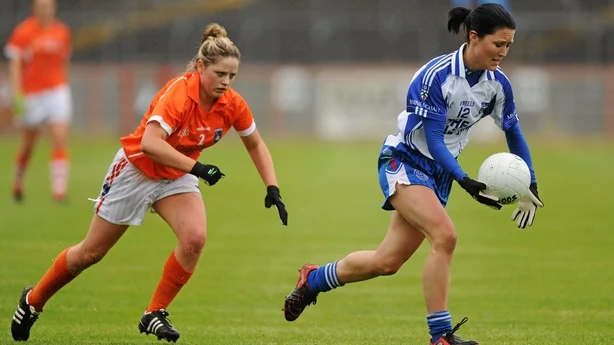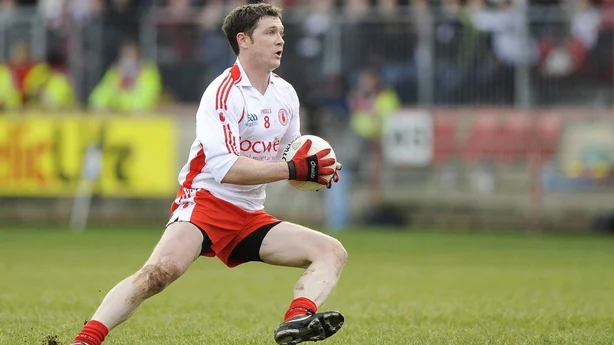There has been no escaping reports of cruciate injuries in the GAA this week.
Mayo's captain Paddy Durcan sustained a season-ending cruciate ligament injury in the last two minutes of his side's victory over Cavan on Saturday.
On Thursday it was reported Armagh's Aimee Mackin would be unavailable for the Orchard County's championship season after being subbed halfway though the second half of their nail-biting Ulster final win over Donegal. Mackin's side went on to win by just one point in injury time.
This is the second time the three-time All-Star has been sidelined by an injury of that nature.
Younger sister Blaithín is also on her way back from a cruciate injury and it begs the question what are the reasons for a seemingly exponential increase of these types of knee injuries.
Durcan and the Mackins are not alone.
Evan Comerford, Paddy Lynch, Paudie McGrogan and Barry O'Hagan are others who have suffered knee injuries recently, and that is by no means an exhaustive list.
Given the situation in the Mackin household genetics is a possible factor, but gender has also been a suggested theme.
There has been a swathe of articles on the topic but the spotlight of this issue has firmly been on women's soccer in recent years.
When asked about the injury at the squad announcement on Wednesday, women's national team coach Eileen Gleeson said it is a concern: "It is great to see more research being announced.
"It is a very complex issue, the female game and female athletes have very different needs to males.
"We all know research in sports is predominantly on males so that needs to change. It needs to be specific, and then we can build out from there and be preventative, and really take care of the detail of what programmes and environments for female athletes need to look like." She added.
A lack of research on rehabilitation methods, footwear not specialised for the female body, as well as historic exclusion of women from research studies in sport and exercise science are touted as reasons for an increased rate of the injury in female sportspeople.
Gaelic football is a dynamic and fast sport involving lots of sprinting, decelerating, changing of direction and physical contact - the potential for knee injuries is ripe, regardless of gender.
While Aimee Mackin is the most recent Armagh player affected, Sinead Kerr (née McCoy), ex-Armagh inter-county player and sister of current panel member Aoife McCoy, identifies as being at the start of the tidal wave of knee injuries in women’s football.
"I feel like I was one of the first. I don't know of anyone else in Armagh that had done their cruciate up until I did mine in 2012.
"Then there was nearly just a bloody domino effect of cruciate injuries in our area.

The Orchard county has been ahead of the game in providing dedicated facilities for the women's team and Kerr says of her time on the panel: "I was 21 and I was so naive at what we needed to do. We didn't have strength and conditioning.
"When I first joined the panel I wasn't aware of water intake and I had to ask what do I need to eat before training," admits Kerr.
Kerr goes on to explain that it's not just nutrition knowledge that has changed, the game has too.
"When I was playing the standard was good but it definitely has changed and moved on.
"Everyone has to be doing the strength and conditioning, you wouldn't be fit to play or strong enough to compete if you don't do it."
"I think it increases the risk of injury," she says of the speed and physicality of the game in recent years.
Unfortunately Kerr’s career finished too early to benefit from the more recent emphasis on strength and conditioning and preventative programmes that are currently being implemented.
The end of the inter-county player's career was a difficult time.
"My cruciate injuries had a massive impact on my life. Aside from the physical pain of it, mentally and emotionally it was very difficult.
"When it happened the third time it was a really hard for me. People probably didn't realise how hard a time it was. I fell away from a lot of things.
"I felt like I had lost a whole group of friends because my life was around football. It’s a big void in your life and it feels like you are grieving. I didn’t watch a football game for two years," the Armagh woman admits.
The impact has not just been short-term.
"My surgeon has said I'm on the road to a knee replacement.
"I don't have much pain but things like running are out of the equation because of the damage that has been done to my knee."
With reported knee injuries on the rise and long-term effects likely, some have called for studies that consider the injury from a more holistic and practical perspective.
Recent dry weather has changed pitch conditions, which can increase the risk of knee related injuries according to a study from American football.
Where there is an increased incidence of injury in American football in spring and summer months versus winter.
The link between pitch surfaces and cruciate knee injuries is well established, explains orthopaedic specialist physio, and former Tyrone player Enda McGinley.
"It's common the way patients describe the injury. Like their foot being stuck and not being able to move it. If the pitch is wetter the foot can slide.
"It's why ACL injuries are so common in skiing where the ankle is fixed.
With more information than ever available to coaches, support staff and players, on first glance it might seem odd that rates of cruciate injuries are on the rise.
McGinley explains that there is no way to completely eradicate risk: "We can't prevent it. We can reduce incidents but we will always see cruciate injuries.
"There is a risk for any injury anytime you take to the football field.
"The best rehab programmes will decrease the risk by a percentage.
"You can prevent them completely by staying in the house," laughs McGinley.

McGinley also reflects that social media can play a role in incidents seeming higher than they are.
"With social media and more media and podcasts with players it means everything is known."
Reflecting on his own time in the game, McGinley remembers players carrying knee injuries: "It was normal to have every team with someone playing with a big blue knee sleeve on.
"They would be carried off and return a few months later, but now we don't see anyone playing with knee support. Which is a good thing.
"Injuries in the past were not picked up or operated on."
From his own time in the sport McGinley added that the number of games have increased: "We used to play a minimum of nine, maximum of 15 games on average.
"By my reckoning the number of games could be 50% higher in today's era."
The fixtures calendar is something that has been debated, and the back-to-back games means there may be less time to work on preventative strategies.
"The game-to-training ratio has changed massively." explains McGinley.
Kerr echos the words of McGinley: "I feel there is more pressure on county girls to play for club and they need them. There is more chance of overload and risk of injury with the more football you play."
McGinley goes on to praise the GAA approach: "The GAA are miles ahead of other sports. One positive is the availability to access MRI scans and surgery, even at club level.
"The GAA insurance scheme means we are picking them up better and quicker than any other sport."
McGinley knows from his role in the NHS in the North, club players from rugby, for example, are enduring long waiting lists to receive scans, treatment and surgery, but in GAA access is fast.
This might mean GAA cruciate injuries will create more headlines, but the likelihood of players returning to the pitch is high.
Disclaimer: The copyright of this article belongs to the original author. Reposting this article is solely for the purpose of information dissemination and does not constitute any investment advice. If there is any infringement, please contact us immediately. We will make corrections or deletions as necessary. Thank you.






